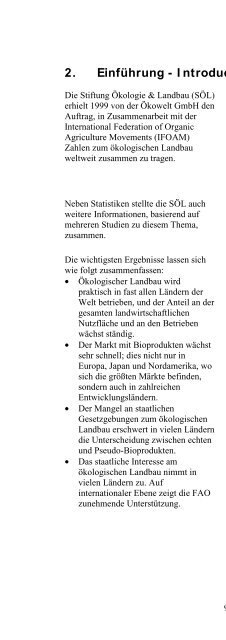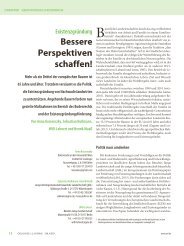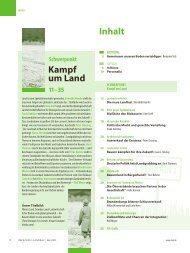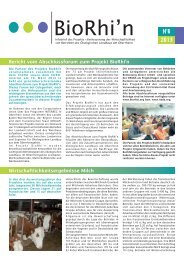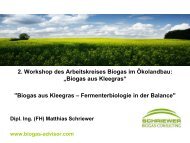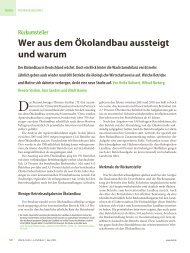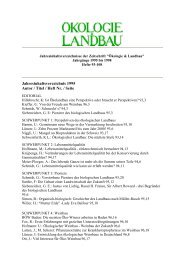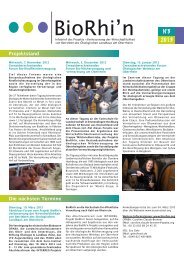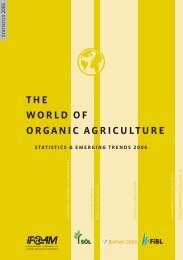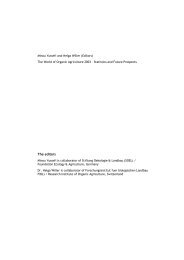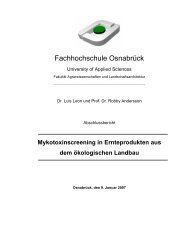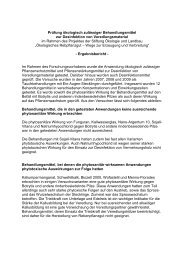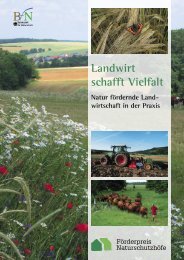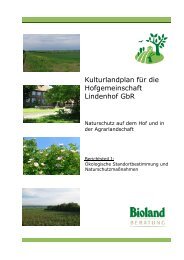Organic Agriculture Worldwide 2000 II - Stiftung Ökologie & Landbau
Organic Agriculture Worldwide 2000 II - Stiftung Ökologie & Landbau
Organic Agriculture Worldwide 2000 II - Stiftung Ökologie & Landbau
Erfolgreiche ePaper selbst erstellen
Machen Sie aus Ihren PDF Publikationen ein blätterbares Flipbook mit unserer einzigartigen Google optimierten e-Paper Software.
2. Einführung - Introduction<br />
Die <strong>Stiftung</strong> <strong>Ökologie</strong> & <strong>Landbau</strong> (SÖL)<br />
erhielt 1999 von der Ökowelt GmbH den<br />
Auftrag, in Zusammenarbeit mit der<br />
International Federation of <strong>Organic</strong><br />
<strong>Agriculture</strong> Movements (IFOAM)<br />
Zahlen zum ökologischen <strong>Landbau</strong><br />
weltweit zusammen zu tragen.<br />
Neben Statistiken stellte die SÖL auch<br />
weitere Informationen, basierend auf<br />
mehreren Studien zu diesem Thema,<br />
zusammen.<br />
Die wichtigsten Ergebnisse lassen sich<br />
wie folgt zusammenfassen:<br />
• Ökologischer <strong>Landbau</strong> wird<br />
praktisch in fast allen Ländern der<br />
Welt betrieben, und der Anteil an der<br />
gesamten landwirtschaftlichen<br />
Nutzfläche und an den Betrieben<br />
wächst ständig.<br />
• Der Markt mit Bioprodukten wächst<br />
sehr schnell; dies nicht nur in<br />
Europa, Japan und Nordamerika, wo<br />
sich die größten Märkte befinden,<br />
sondern auch in zahlreichen<br />
Entwicklungsländern.<br />
• Der Mangel an staatlichen<br />
Gesetzgebungen zum ökologischen<br />
<strong>Landbau</strong> erschwert in vielen Ländern<br />
die Unterscheidung zwischen echten<br />
und Pseudo-Bioprodukten.<br />
• Das staatliche Interesse am<br />
ökologischen <strong>Landbau</strong> nimmt in<br />
vielen Ländern zu. Auf<br />
internationaler Ebene zeigt die FAO<br />
zunehmende Unterstützung.<br />
9<br />
In 1999 Ökowelt GmBH commissioned<br />
<strong>Stiftung</strong> <strong>Ökologie</strong> & <strong>Landbau</strong><br />
(SÖL, Foundation Ecology & <strong>Agriculture</strong>)<br />
to compile statistical<br />
information on organic agriculture<br />
world-wide. IFOAM, the International<br />
Federation of <strong>Organic</strong> <strong>Agriculture</strong><br />
Movements collaborated in this<br />
project.<br />
Apart from gathering statistical<br />
information SÖL also put together<br />
other relevant information on the<br />
subject.<br />
The main findings of this compilation<br />
could be summarised as followed:<br />
• <strong>Organic</strong> agriculture is practised in<br />
almost all countries of the world,<br />
and its shares of agricultural land<br />
and farms is growing everywhere.<br />
• The market with organic products<br />
is growing at a fast rate, not only<br />
in Europe, Japan and North<br />
America (which are the major<br />
markets) but also in many other<br />
countries, including many<br />
developing countries.<br />
• Lack of state regulations for<br />
organic agriculture makes it<br />
difficult in many countries to<br />
distinguish organic from lowchemical<br />
or even non-organic<br />
products<br />
• Official interest in organic agriculture<br />
is emerging in many countries.<br />
On an international level<br />
FAO is giving increasing support<br />
to organic farming.


